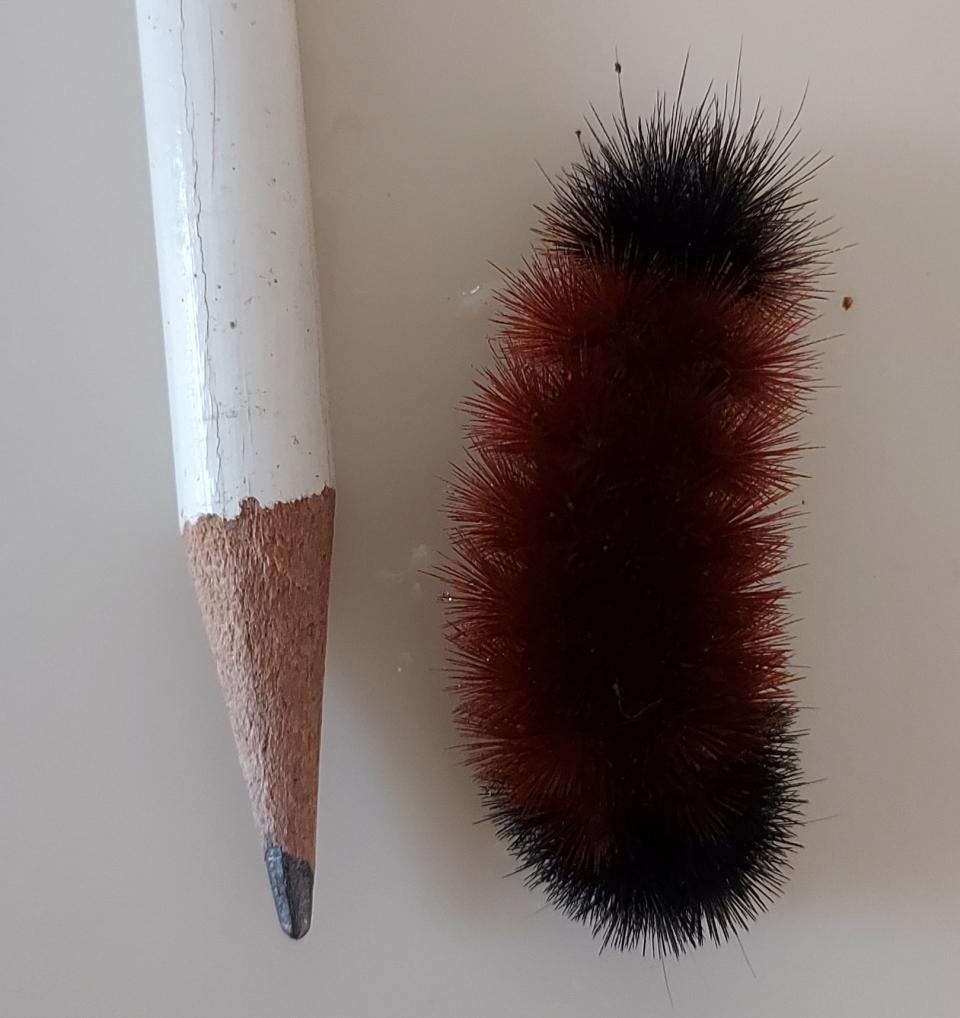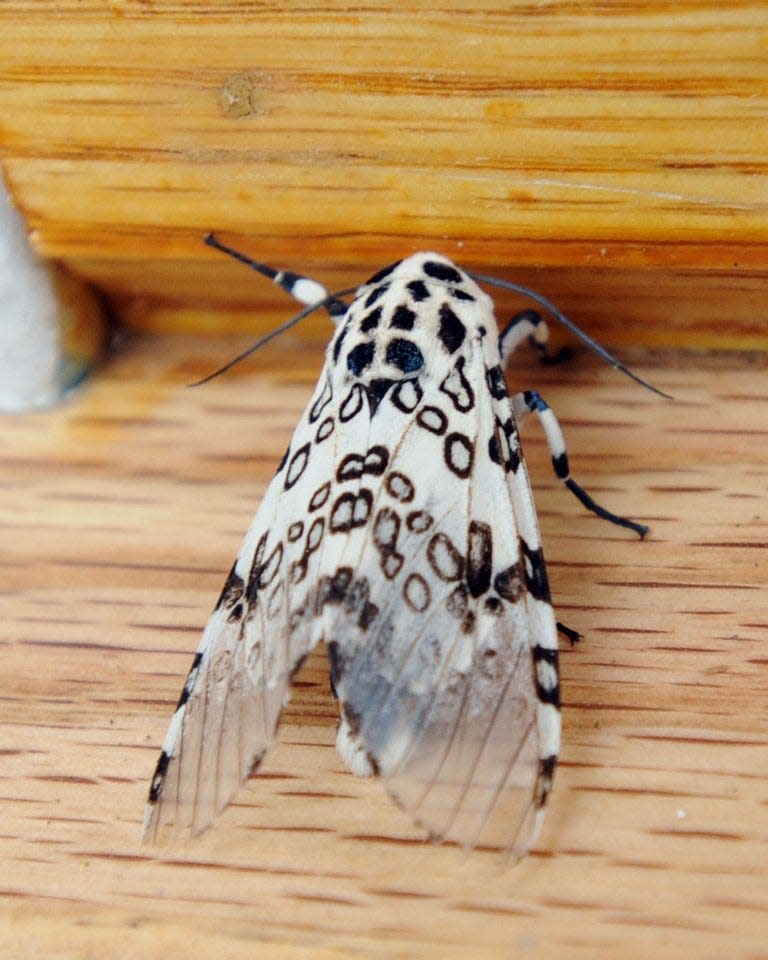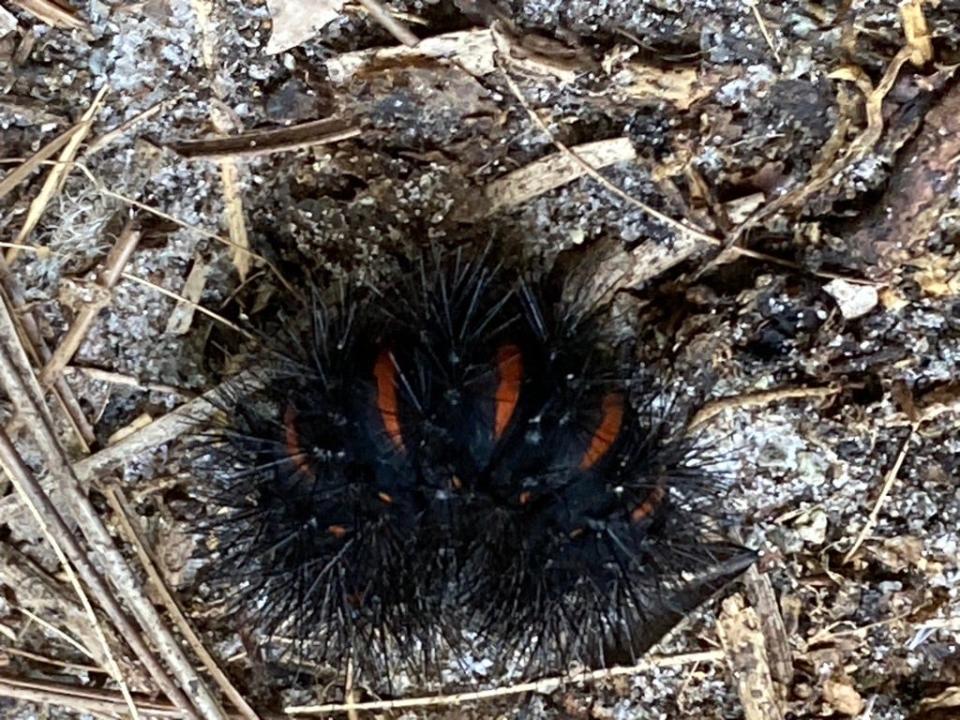Cold weather in Florida? Folklore says woolly bear caterpillars can predict the winter
It's so hot in Florida, we'll believe anything.
The Farmers' Almanac recently released its 2024 winter weather predictions and a story on its site talks about a woolly bear caterpillar's supposed ability to predict winter weather.
The fuzzy caterpillars have been spotted in Florida − does that mean they can predict how cold it'll get in the Sunshine State?
If you're a believer ... yes.
If you're not ... keep reading to learn about the black and orange spiky, fuzzy creature.
Snow and frozen iguanas? For Florida winter 2024, Farmers' Almanac says expect "a few frosts"
Floridians are getting fed up with record summer heat. When does Florida actually get cold?
What is a woolly bear caterpillar?

A giant woolly bear caterpillar is a mostly black caterpillar with red or orange spiracles. They can measure up to 3 inches long before transforming into a giant leopard moth, the largest eastern tiger moth, according to the University of Florida. Its scientific name is Hypercompe scribonia. What's really interesting and almost hard to believe is the transformation, from a black fuzzy worm to a beautiful moth patterned with leopard spots.
Woolly worm weather predictions. Can they really predict the weather? Entomologist weighs in
How do woolly bear caterpillars predict winter weather?
According to a story posted Aug. 17 on the Farmers' Almanac site, "The banded woolly bear, also known as the woolly worm caterpillar, is considered a 'nature’s sign' for predicting winter weather. Folklore suggests that a narrow orange band on the caterpillar indicates a snowy winter, while a wide band suggests a mild winter. Additionally, fuzzier-than-normal woolly bear caterpillars are believed to be a sign of a very cold winter."

The almanac also cited the woolly bear caterpillar in its "20 signs of a hard winter" report. The worm ranked No. 18 of the 20 signs.
A 2021 Rockland/Westchester Journal News story addressed woolly bear caterpillars' ability to predict winter weather. The USA TODAY Network newspaper cited National Weather Service variables:
The amount of black on the caterpillar in autumn indicates the severity of weather in the area where it's found. More black equals longer, colder, snowier. Less black equals milder winter weather.
The location of the black bands is said to predict which part of winter will be worse. If the head of the caterpillar is dark, winter will start cold. If the tail is dark, the end of winter will be worse.
There's also the coat itself. If the woolly bear is extra woolly, it will be a cold winter. Slim coat means a milder winter.
What do the woolly bear caterpillars predict for 2024 winter weather in Florida?

In mid-July, USA TODAY Network-Florida reporter Cheryl McCloud spotted the caterpillar in her Treasure Coast, Florida, yard as it headed toward the front door. She described the creature as a red and black caterpillar with fuzzy spikes. Her photos show it was mostly black with thin red bands. (She didn't touch it. She didn't want to.)
If folklore dictates a narrow orange band on the caterpillar indicates a snowy winter while a wide band suggests a mild winter, a "snowy" winter could be in store for Florida − according to the wives tale.
If the National Weather Service factors are considered, more black on the caterpillar equals longer, colder, snowier weather. And judging by the coat? "If the woolly bear is extra woolly, it will be a cold winter," the Rockland/Westchester Journal News story states. According to McCloud's photos, the Florida caterpillar was mostly black and pretty woolly (or spiky). Those signs point to a colder winter for Florida.
Snow, frozen iguanas for Florida winter 2024? Farmers' Almanac says expect 'a few frosts'
What did the Farmers Almanac predict for 2024 winter season for Florida?
Editors at the Farmers' Almanac say "the BRRR is back!" and while previous winter seasons were unusually warm across the country, "winter weather is making a comeback ... traditional cool temperatures and snowy weather conditions will return to the contiguous United States."
No snow for Florida, but precipitation may affect our temps. "The Southeast and Florida will see a wetter-than-normal winter, with average winter temperatures overall, but a few frosts may send many shivers to snowbirds trying to avoid the cold and snow back home," the Farmers' Almanac predicted. "For those of you living along the I-95 corridor from Washington to Boston, who saw a lack of wintry precipitation last winter, you should experience quite the opposite, with lots of rain/sleet and snowstorms to contend with."
In addition, the almanac predicted unseasonably cold temperatures blowing into the Southeast States in mid-February.
The Farmers' Almanac, which is based in Lewiston, Maine, has released its extended weather forecast since 1818. The editors there pride themselves on using a mathematical and astronomical formula for its predictions, and over the years have been fairly accurate, to various degrees.
Does the Farmers' Almanac use woolly bear caterpillars to predict the weather?
No. According to the Farmers' Almanac site, "We don’t use the woolly bear caterpillar or any other bits of folklore to make our predictions."
Contributing: Cheryl McCloud, USA TODAY Network-Florida; Lilly St. Angelo, USA TODAY Network
Sangalang is a lead digital producer for USA TODAY Network-Florida. Follow her on Twitter or Instagram at @byjensangalang. Support local journalism. Consider subscribing to a Florida newspaper.
This article originally appeared on Florida Today: Farmers Almanac, fuzzy worms say few frosts, cold weather to hit Florida

